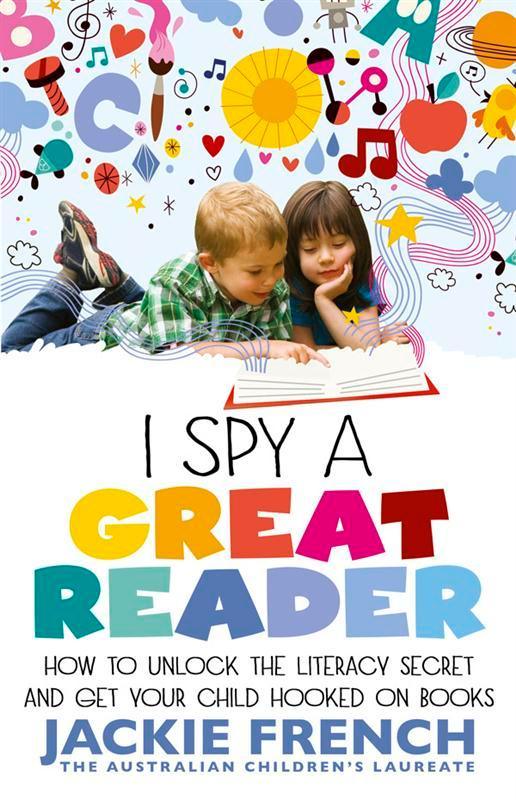Jackie French, I Spy a Great Reader: how to unlock the literacy secret and get your child hooked on books, HarperCollins, 1 August 2014, $19.99 (pbk), $9.99 (ebook), 312pp., ISBN 978-0-7322-9952-1
This book speaks strongly of French’s passion for books and reading and the pleasure of reading. Books are not dead; the children’s book industry in Australia is thriving and we owe it to our children to enable them to enjoy this richness. French gives many reasons why developing a love of books is so important, pointing out that “every book a child reads is part of [their]life’s experience” ( p. 232).
This will be a valuable book for parents wanting to encourage reading and would be useful in all infant welfare centres and the equivalent. French encourages reading to children from the earliest possible time – babies love being read to; it’s such a warm and companionable thing to do.
She also encourages involvement of other adults in reading to children, even embracing technology such as Skype to allow reading time with grandparents and other family members who may not live close by.
French gives lots of practical activities and tips such as games to play with children to encourage a love of words. These include such things as drawing and then writing descriptive words underneath, playing rhyming games and labelling objects around the house. She also gives lots of games to help concentration and coordination. Modelling reading is, as French points out, really important. A child just learning to read is much less likely to see the value in doing so if no-one else in the house reads. Visits to the local library for story sessions and to borrow books are fun activities and borrowing books from the library will allow children to have the choice of lots and lots of books.
French provides lists of books suitable for different age groups. These can, of course, be only a guide as children’s reading levels and interests do vary widely. However, book shops and organisations such as The Children’s Book Council of Australia are often asked by parents and grandparents to recommend books suitable for particular ages, so French’s lists do provide a helpful preliminary guide. She also helps parents to recognise that children learn differently.
But this is a book which will be useful to parents with children much older than babies as it covers babies to secondary school children. The book doesn’t stop at “getting started”; French also writes about how to sustain a child’s love of reading; how to help teenagers who can’t read; encouraging family reading and forming book groups. The book has 13 chapters, each divided into accessible, “bite-sized” sections on particular topics and its richness is difficult to do justice to in a short review.
Above all, as she says, reading should be fun! She is a testament to the importance of reading. She is, as she readily points out, dyslexic, but books are her life.
reviewed by Margot Hillel

